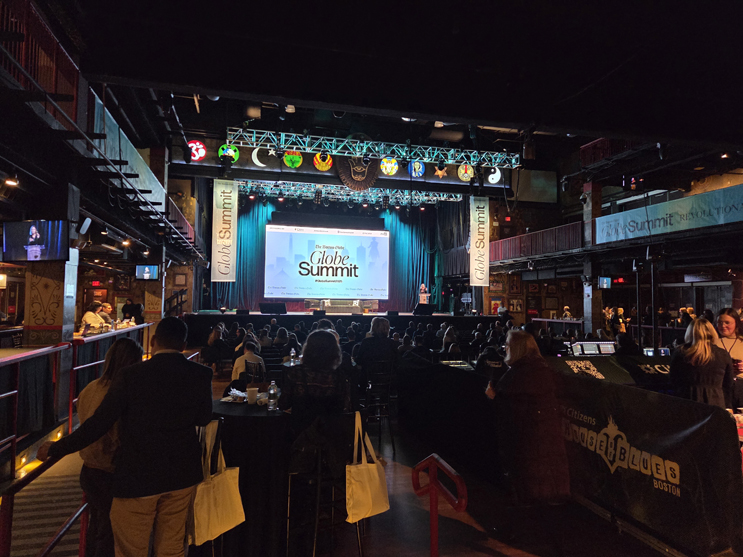From Funding Gaps to AI Frontiers: Insights from the Boston Globe Summit 2025

By Ray Dogum, Chief Editor, Drug Discovery Online
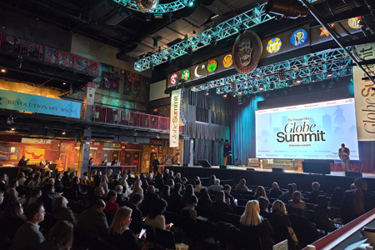
On November 18th, 2025, I had the opportunity to attend the 5th annual Boston Globe Summit, held in the House of Blues Boston. A concert venue I’ve enjoyed many times over my decade-plus years in this town, but the shows usually involved more dancing where all the people seated in chairs were. I think the intimate setting made the ideas shared on stage even more powerful.
My interest there was in understanding the prevailing perspectives on drug discovery research and its relationship to healthcare delivery in Massachusetts and across the U.S.
- Where do the paths of researchers and patients intersect?
- How are exponential technologies and better human coordination improving our ability to test new medicines more safely and effectively?
- Who is funding early-stage research?
- What should we expect from government and philanthropy?
Here are some insights I gleaned from my experience that attempt to address some of these multi-faceted questions.
Declining Research Roles and Limited Seed Funding in Massachusetts
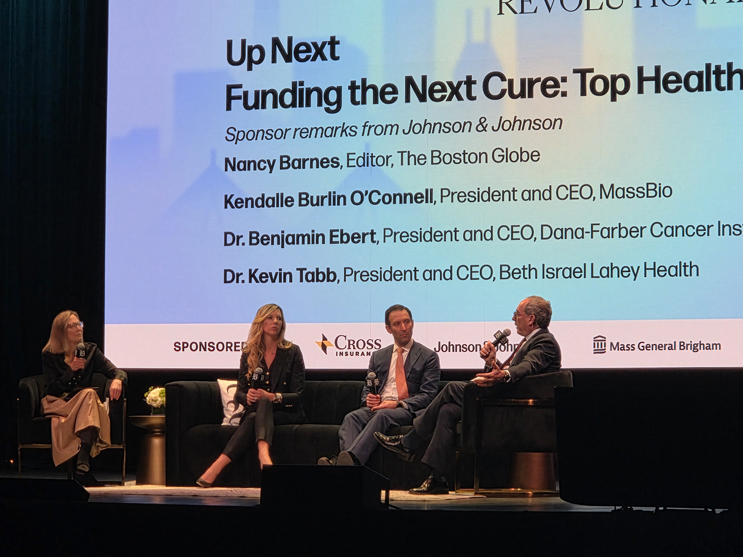
MassBio’s President and CEO, Kendalle Burlin O’Connell, who has worked for the biotech innovation catalyzer for over 17 years shared her concerns about research funding on a panel, ‘Funding the Next Cure: Top Healthcare CEOs’.
She said, “this is the first time that I've seen, in Massachusetts, a drop in jobs in research and development." She continued, “We lost about 1,000 jobs from 2024 to 2025 and we've lost about 800 jobs so far this year. This year has been particularly challenging for the earliest stages of innovation. Pre-seed series rounds, and funding venture investment has been down altogether, some of the lowest numbers that we've seen since 2017.”
She then reassured the audience, “although I will say the second half of the year has picked up” and reminded the potential generalist investors in the audience that, “it's not for the faint of heart, 90% of biotech companies fail. So it is a risky business, but the reward is incredible. It's about changing people's lives.”
When asked about how patients are feeling given the recent federal funding cuts to Medicaid and other institutions, fellow panelists, Dr. Kevin Tabb, President and CEO of Beth Israel Lahey Health, and Dr. Benjamin Ebert, President and CEO of Dana-Farber Cancer Institute emphasized the importance of keeping patients first, no matter what. While that’s certainly a prime directive for physicians, it can be a challenge in uncertain financial environments.
Dr. Ebert alluded, “I don't think that there was any real impact at all other than the feeling of uncertainty that's in the newspapers and things. We continued all of our clinical trials, we have about 1200 clinical trials, they were all continued. But I think this feeling of uncertainty is actually very insidious in that it affects people's career choices. It affects people who are thinking about coming to Boston from all over the world to do their training, to do research. And if that changes our ability to attract the best and brightest from all over, that will have a long-term impact on our city and in our ecosystem.”
Pushing The Limits of Genome Editing Technology
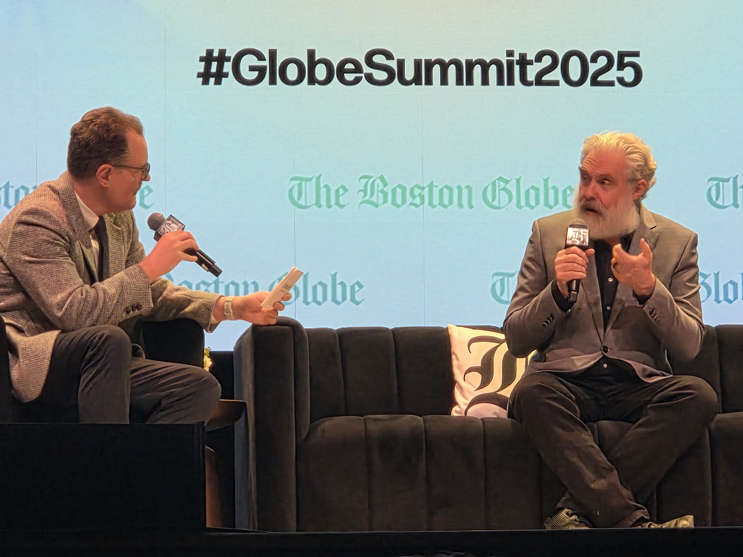
George Church, Ph.D., Professor of Genetics at Harvard Medical School, joined STAT Senior Writer, Matthew Herper on stage for a fireside chat where Dr. Church discussed his excitement for gene editing genes in pigs to develop human-compatible kidneys, livers, and hearts. He reminded his audience of a hard truth: “ in the United States alone, over 500,000 people are on kidney dialysis, at least 90,000 of whom qualify for transplants, yet only 25,000 of them are getting them. So a lot of people die even while they're on dialysis. It's a brutal existence.”
”We've made an organism that's resistant to all viruses, even ones we've never seen before. Anything in nature. We are pretty convinced it's resistant to them now. It took us 20 years to make it. Looks pretty good and now we're trying to do that same thing again for, you know, pigs and human cells,” he shared.
It’s great to see Dr. Church looking as young as he was when he joined me on a podcast in 2018, talking about one of his companies leveraging blockchain technology to secure personal genetic information.
AI’s Growth Potential Unpredictable
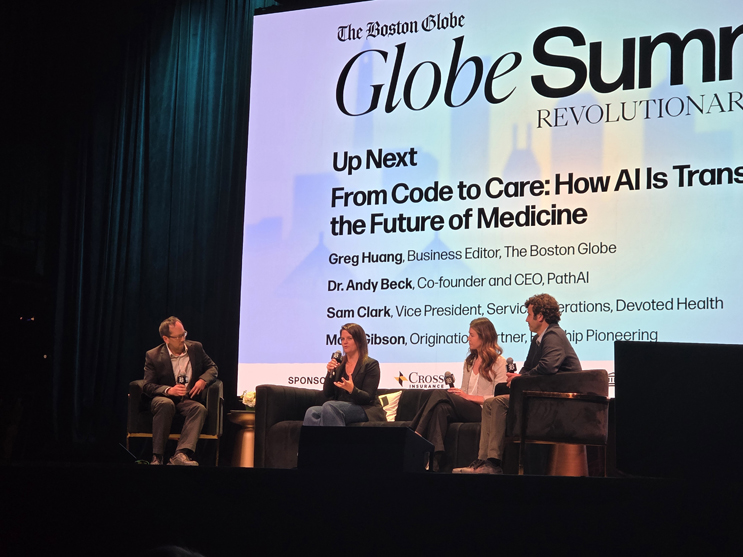
As we’ve acknowledged in previous editorials, AI is no longer just accelerating drug discovery, it’s redefining what’s possible. As Molly Gibson, Partner at Flagship Pioneering and Co-Founder of Generate:Biomedicines, explained, “we started Generate:Biomedicines about eight years ago with the mission to use generative AI to actually use a machine to generate medicines… At that time, this seemed completely crazy.” Today, that vision is becoming a reality, with companies now building software to design antibodies and molecular structures de novo. The shift from skepticism to adoption in under a decade underscores the extraordinary pace of change.
What’s next may be even more transformative. Molly noted that humans excel at forming hypotheses and designing experiments, but AI could soon take on that role too: “What if AI could run the scientific method? Could it expand knowledge and build towards what we’re calling scientific super intelligence, which is the vision behind [Flagship Pioneering backed] Lila?” While that sounds ambitious, the trajectory suggests it’s not far-fetched. In just two years, ideas once dismissed as hype are gaining traction, signaling a future where AI doesn’t just assist science, it performs it.
It's worth noting, on July 23, 2025, Generate:Biomedicines eliminated about 10% of roles in order to “purposefully rebalance” its talent.
Cautious Confidence in a Shifting Landscape
It’s clear the Boston healthcare and biotech ecosystem faces challenges, but this is a city built on revolutions—scientific, technological, and cultural. From the conversations I had, the energy among innovators is unmistakable. We’re uncovering insights into biology and medicine at an unprecedented pace. That sense of growth is what keeps Boston at the forefront of global life sciences. However, we shouldn’t be complacent with our existing infrastructure. We should continue to foster talent, inspire creativity, and fund moonshot projects, even during uncertain times.
